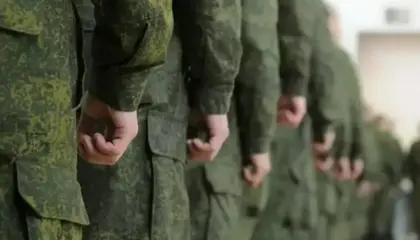Russia’s approach to psychological support for its soldiers is as mercenary and brutal as its approach to the battlefield.
The Telegram channel of WarGonzo, a pro-Russian military blog site and propaganda outlet, yesterday posted what is effectively an advertisement for military psychological support training that offers $300 sign-up bonuses to potential applicants.
JOIN US ON TELEGRAM
Follow our coverage of the war on the @Kyivpost_official.
WarGonzo stated that “the [Russian] Military of Defense has begun developing a program of psychological assistance to participants in the Special Military Operation [full-scale invasion of Ukraine – ed.].”
“In this regard, those who want to help the country have the opportunity to receive additional income. Now, you can study psychology online, with the awarding of a diploma in the established way. Within six months, start earning by combining study with work,” WarGonzo’s post continued.
“Such opportunities are offered by the licensed Institute of Psychology ‘Smart’… You will have an average of 400 hours of practice, work with real clients, and support in creating additional income in psychology,” the post added.
“Take a short test and find out how much additional income you will receive in psychology in six months. For passing, you will receive a grant of 30,000 rubles ($325) for education, which will cover a significant amount of the costs, and a consultation with the admissions committee. Start now with the link,” WarGonzo offers its readers.

Russia Hurls Intercontinental Missile at Ukraine: A Shocking Escalation
WarGonzo’s recruitment ad comes in the context of repeated accusations that Russia does little if anything for soldiers returning from the battlefields of Ukraine – and that this will have consequences for the country’s future.
“The difficulties of reintegrating into society faced by Russian soldiers who have begun trickling back home from Ukraine looks set to pose a huge social challenge for the country in the months and years to come,” The Moscow Times wrote.
Ukraine war veterans who spoke to The Moscow Times at the time said that they had not been offered any psychological support and that it was impacting their lives and those around them.
“He is looking for enemies,” one woman from the southern city of Nalchik said of her recently discharged brother in an interview relayed by The Moscow Times. “It’s difficult for him to get used to civilian life. If this phase doesn’t pass, but gets worse, I won’t know what to do.”
A recent analysis by the US-based RAND Corporation think-tank said Russia faces a “ticking social time-bomb… as troops return to their towns and villages.”
“Just as the terms ‘Afghan Syndrome’ and ‘Chechen Syndrome’ emerged to describe the situation of Russian veterans who lacked support and struggled to adapt to civilian life after those conflicts, it is only a matter of time before ‘Ukraine Syndrome’ grips Russia, as thousands of veterans suffering from post-traumatic stress disorder (PTSD) or other conditions return home,” RAND wrote.
WarGonzo, which largely cheerleads for the war against Ukraine, is likely run by Semyon Pegov, a Russian “journalist.”
Pegov was among 300 media workers who were secretly awarded in 2014 for “objective coverage of events in Crimea.”
In October 2022, it was reported that Pegov was wounded near Donetsk. Pegov was subsequently awarded the Order of Courage by Russian dictator Vladimir Putin.
In June 2023, Pegov was reportedly among a selection of Russian “war correspondents” and milbloggers handpicked to meet President Putin in the Kremlin on the topic of Ukraine.
The insight into Russian military culture comes while Atesh, a Russian-language, pro-Ukrainian partisan movement operating in occupied territories, revealed some of the brutal treatment meted out to Russian soldiers who don’t comply with their commanders.
In its Telegram channel yesterday, Atesh posted an article under the following headline: “Rashists torture their soldiers in the Zaporizhzhia region.”
“An Atesh source told us that, in the village of Rozivka, Zaporizhzhia region, the occupiers have set up a torture chamber in the basement of one of the houses. There they abuse and rape their soldiers, who are deserters and refuseniks. Locals say that screams are constantly heard,” Atesh said.
Atesh then provided the address of the alleged torture chamber as 39 Lenin Street in Rozivka, Zaporizhzhia region.
While most Russians appear to want to continue the war on Ukraine, according to independent polls and surveys, there is potentially growing concern in some sectors of Russian society with the massive cost of the illegal full-scale invasion.
In the last week, six military recruitment offices across the country have been the targets of arson assaults, which may be protests against military conscription or the war itself.
Yesterday, in St Petersburg, an unknown girl tried to set fire to the building of the Military Commissariat on English Avenue, according to the Shot Telegram channel.
“Probably, a girl in a headscarf threw a bottle with an incendiary mixture at the entrance, after which she disappeared from the scene of the crime. Employees of the military committee were able to put out the fire themselves. The police are looking for the culprit,” the channel reported.
Later, the Baza Telegram channel published a video of the moment when the Military Commissariat was set on fire.
The footage shows how the girl approached the entrance to the building, placed a bundle near the door, and set it on fire.
Russian Telegram channels write that this is the third attempt to burn down the Military Commissariat, including a ram raid [driving a (usually stolen) car into a building, especially with glass windows – ed.] on July 31.
You can also highlight the text and press Ctrl + Enter






